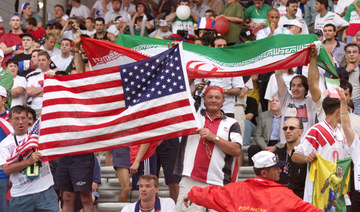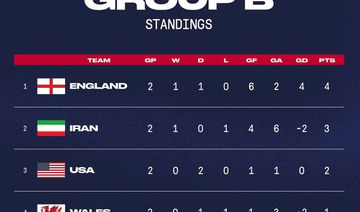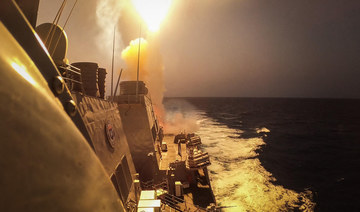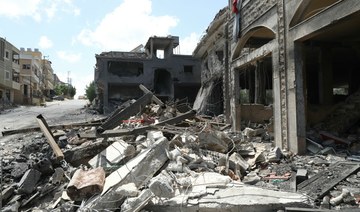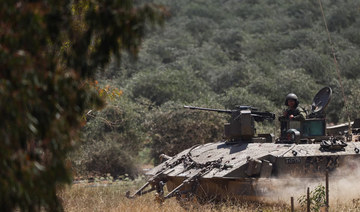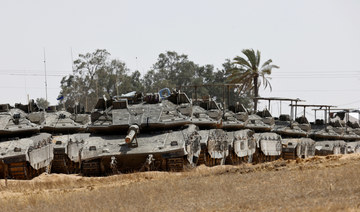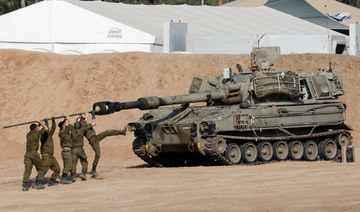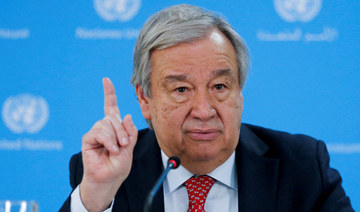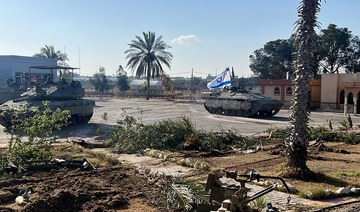BAGHDAD: The US team’s victory over Iran at the World Cup on Tuesday was closely watched across the Middle East, where the two nations have been engaged in a cold war for over four decades and where many blame one or both for the region’s woes.
Critics of Iran say it has fomented war and unrest across the Arab world by supporting powerful armed groups in Lebanon, Syria, Iraq, Yemen and the Palestinian territories. Supporters view it as the leader of an “axis of resistance” against what they see as US imperialism, corrupt Arab rulers and Israel’s oppression of the Palestinians.
The divide is especially intense in Lebanon and Iraq, where heavily armed Iran-backed political factions vie for political influence with opponents more oriented toward the West. In those countries, many believe Iran or the US are due for comeuppance — even if only on the pitch.
Others wished a plague on both their houses.
“Both are adversaries of Iraq and played a negative role in the country,” Haydar Shakar said in downtown Baghdad, where a cafe displayed the flags of both countries hanging outside. “It’s a sports tournament, and they’re both taking part in it. That’s all it is to us.”
A meme widely circulated ahead of Tuesday’s match between the US and Iran jokingly referred to it as “the first time they will play outside of Lebanon.” Another Twitter user joked that whoever wins the group stage “takes Iraq.”
The Iran-backed Hezbollah was the only armed group to keep its weapons after Lebanon’s 1975-1990 civil war. It says its arms are needed to defend the country from Israel and blames Lebanon’s economic crisis in part on US sanctions. Opponents decry Hezbollah as an “Iranian occupation,” while many Lebanese accuse both the US and Iran of meddling in their internal affairs.
In Iraq, the 2003 US-led invasion led to years of intense violence and sectarian strife, and Iran-backed political factions and militias largely filled the vacuum. While US forces and Iran-backed militias found themselves on the same side against the Islamic State extremist group, they have traded fire on several occasions since its defeat.
Both Lebanon and Iraq have had to contend with years of political gridlock, with the main dividing line running between Iran’s allies and opponents.
In Yemen, the Iran-aligned Houthi militia captured the capital and much of the country’s north in 2014. The Houthis have been at war since then with an array of factions supported by Saudi Arabia and the United Arab Emirates, two US allies.
In Syria’s civil war, Iran supported President Bashar Assad’s government against rebels, some supported by the West. In the Palestinian territories, it backs Hamas and Islamic Jihad, militant factions that do not recognize Israel and have carried out scores of attacks over the years.
Interviews with soccer fans in Beirut and Baghdad revealed mixed emotions about the match.
In Beirut’s southern suburbs, a center of Hezbollah support, young men draped in Iranian flags gathered in a cafe hung with a “Death to America” flag to watch the match.
“We are against America in football, politics and everything else,” Ali Nehme said. “God is with Lebanon and Iran.”
Across the city on the seafront promenade, Beirut resident Aline Noueyhed said, “Of course I’m not with Iran after all the disasters they made. Definitely, I’m with America.” She added, however, that the US also was “not 100 percent helping us.”
The post-game reaction in the streets of Beirut after the US defeated Iran 1-0, eliminating it from the tournament and advancing to the knockout round, was far more subdued than after the previous day’s win by Brazil — a fan favorite in Lebanon — over Switzerland.
In Baghdad, Ali Fadel was cheering for Iran, because “it’s a neighboring country, an Asian country.”
“There are many linkages between us and them,” he added.
Nour Sabah was rooting for the US because “they are a strong team, and (the US) controls the world.”
In Irbil in Iraq’s semi-autonomous Kurdish region in the north, fans also gave mixed reactions.
Twenty-seven-year-old Zainab Fakhri was rooting for the US to beat Iran “to punish the Iranian regime that has been oppressing the women’s revolution,” referring to recent protests there.
At the same cafe, Aras Harb, 23, was backing Iran. “We prefer them because my family were able to flee there during the war, and the Iranian people are kind.”
Saad Mohammad, 20, had been hoping for a tie, fearing that a win could worsen an already alarming security situation. If locals celebrate the win, he said, “I fear Iran will launch rockets at us.”
Although the Iran supporters were visibly upset at their loss, the crowd filed out after the game without incident.
Regional politics hovered over the last matchup, at the 1998 World Cup, when Iran famously defeated the US 2-1, eliminating it from the tournament. That came less than two decades after Iran’s Islamic Revolution toppled the US-backed shah and protesters overran the US Embassy, leading to a prolonged hostage crisis.
French riot police were on site at the stadium in Lyon that year, but they weren’t needed. The teams posed together in a group photo, and Iran’s players even brought white roses for their opponents.
In this year’s matchup, allegiances have been scrambled by the nationwide protests gripping Iran, with some Iranians openly rooting against their own team. The players declined to sing along to their national anthem ahead of their opening match, in what was seen as an expression of sympathy for the protests, but reversed course and sang ahead of their next one.
In some neighborhoods of Tehran, people chanted “Death to the dictator!” after the match, even though it was past midnight local time.
Danyel Reiche, a visiting associate professor at Georgetown University Qatar who has researched the politics of sports, said World Cup fandom is not necessarily an indicator of political affiliation, even in countries with deep divisions.
Local sports in Lebanon are “highly politicized,” with all the major basketball and soccer clubs having political and sectarian affiliations, he said. But when it comes to the World Cup — where Lebanon has never qualified to play — fans latch on to any number of teams.
That’s true across the region, where fans sporting Lionel Messi or Cristiano Ronaldo jerseys can be found from Gaza to Afghanistan.
“This is one of the few spheres where people have the liberty and freedom to choose a country that they simply like and not the country where they think there’s an obligation for them to be affiliated with it,” Reiche said.
US-Iran match mirrored a regional rivalry for many Arab fans
https://arab.news/6a3hp
US-Iran match mirrored a regional rivalry for many Arab fans
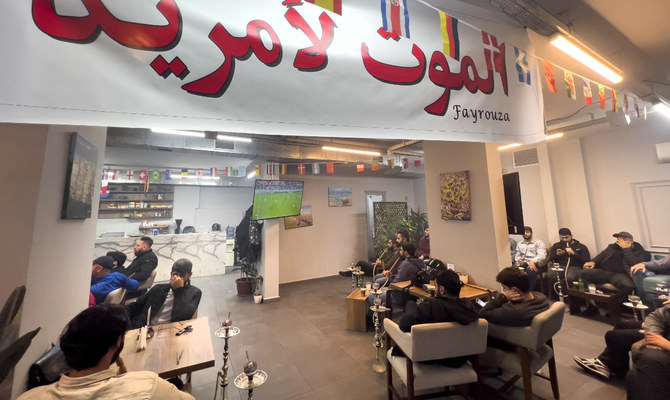
- Critics of Iran say it has fomented war and unrest across the Arab world by supporting powerful armed groups in Lebanon, Syria, Iraq, Yemen and the Palestinian territories
UK marine agency reports two explosions in Gulf of Aden
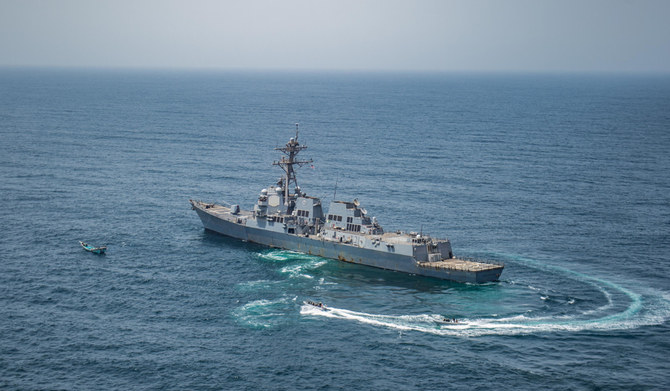
- The Houthi militia that controls the most populous parts of Yemen and is aligned with Iran have staged attacks on ships in the waters off the country for months
AL-MUKALLA: The UK Maritime Trade Operations reported on Tuesday two explosions near a ship in the Gulf of Aden as international marine task forces in the Red Sea shot down drones fired by the Yemeni Houthi militia.
The skipper of a ship transiting the gulf notified the UK maritime agency of two explosions “in close proximity to” the ship 82 nautical miles south of Yemen’s southern city of Aden, and that the ship and crew were unharmed.
The incident prompted the UKMTO to encourage ships traveling in the Gulf of Aden to be cautious and to report “any suspicious activity.”
This comes as the US military and the EU naval operation in the Red Sea said they shot down Houthi drones in the previous 24 hours.
US Central Command announced in a statement on Tuesday that its forces destroyed on Monday one uncrewed aerial system fired by the Houthis from Yemeni territory under their control, targeting foreign commercial and navy ships in the Red Sea.
“It was determined the UAS presented an imminent threat to US, coalition forces, and merchant vessels in the region,” USCENTCOM said.
The EU mission in the Red Sea, known as Eunavfor Aspides, said an Italian frigate shot down one drone on Monday while responding to a strike conducted by the Houthis from regions under their control in Yemen.
Until Tuesday afternoon, the Houthis had not claimed responsibility for new strikes on commercial or navy ships in the Red Sea or Gulf of Aden.
Since November, the Houthis have seized a commercial ship, sunk another, and launched hundreds of drones and ballistic missiles against vessels in the Red Sea, Gulf of Aden, Bab Al-Mandab Strait, and, most recently, the Indian Ocean in support of the Palestinians against Israel’s war in Gaza.
On Friday, the Houthis said they will expand their campaign against Israel to the Mediterranean, targeting Israel-linked ships there and any place within range of their drones and missiles.
Meanwhile, the Houthis claimed on Monday to have uncovered an “espionage” network working for the US and Israel.
Houthi media broadcast images and videos of 10 individuals from the western province of Hodeidah who admitted to being recruited by Yemeni military officers at military locations under government control.
They claimed that these individuals were given the task of gathering information about the locations of missile and drone launchers, boats, weapons storage facilities, trenches, and movements of the Houthi forces, and that their information assisted US and UK strikes at those locations.
The Houthis accused Ammar Mohammed Abdullah Saleh, a former intelligence official and brother of Tareq Saleh, a member of the country’s presidential council, of running the dismantled network from a military base on the country’s western coast.
In 2022, a Houthi court in Sanaa sentenced Ammar Saleh to death in absentia for allegedly damaging Yemeni military missiles and air-defense systems while serving as the deputy director of the National Security Bureau.
Yemen’s Minister of Information Moammar Al-Eryani described the Houthi claims as “fabricated lies,” accusing them of torturing “innocent” people who appeared on the footage to convince them to admit to crimes they did not commit.
He added that the Houthis were using Israel’s war in Gaza to lay the groundwork for a new military operation against the Yemeni government.
“The terrorist Houthi militia’s scapegoating of innocent inhabitants of Tehama (Hodeidah), dictating them these lines as depicted in the false scenes it disseminated, and forcing them to make unfounded confessions through torture, pressure, and coercion,” Al-Eryani said on X.
Human Rights Watch says Israel attack on Lebanon rescuers was unlawful
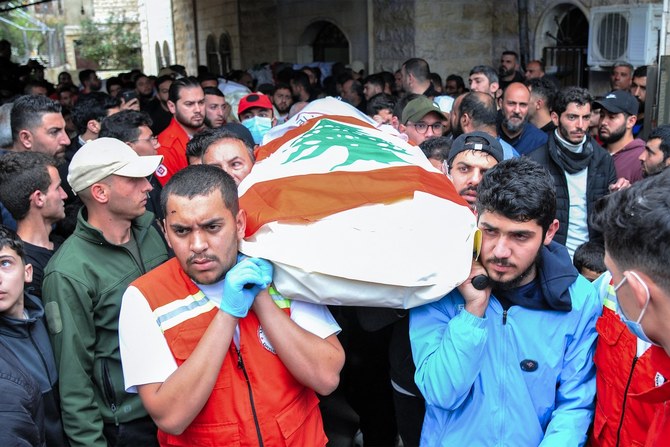
- HRW’s Lebanon researcher Ramzi Kaiss: ‘Israeli forces used a US weapon to conduct a strike that killed seven civilian relief workers in Lebanon who were merely doing their jobs’
- Activists from the Gathering of Free University Students organized a demonstration in front of the American University of Beirut campus in support of Palestine and the people of Gaza
BEIRUT: Human Rights Watch on Tuesday said an Israeli strike in Lebanon that killed seven first responders was “an unlawful attack on civilians,” and urged Washington to suspend the sale of weapons to Israel.
“An Israeli strike on an emergency and relief center” in the southern village of Habbariyeh on March 27 “killed seven emergency and relief volunteers,” constituting an “unlawful attack on civilians that failed to take all necessary precautions,” HRW said in a statement.
It said the massacre was committed against “a civil society association that provides emergency services, ambulances, first-aid training, and primary care and relief services in Lebanon.”
Furthermore, HRW said it “did not find any evidence of the presence of military targets at the site that was targeted with the acknowledgment of the Israeli army, which did not take possible precautions to ensure that the target was military … which makes the raid illegal.”
Ramzi Kaiss, HRW’s Lebanon researcher, said: “Israeli forces used a US weapon to conduct a strike that killed seven civilian relief workers in Lebanon who were merely doing their jobs.”
He said the Israeli army used US-made ammunition to carry out the raid.
HRW said it “sent a letter containing the results of reviewing the photos and videos of the site before and after the raid, including a video of the remnants of the ammunition found at the site, and questions to the Israeli army and the US State Department on April 19, but did not receive any response.”
The rights group said it found a metal fragment at the site of the bombing with “MPR 500” written on it, confirming that it is from a 500-pound general-purpose bomb made by Israeli company Elbit Systems, and the fragments and fins are part of a joint direct attack munition set manufactured by American company Boeing.
HRW urged the US to “immediately suspend arms sales and military assistance to Israel given evidence that the Israeli military is using US weapons unlawfully.”
The organization asked Lebanon’s Foreign Ministry to “take immediate action by submitting a declaration to the International Criminal Court, allowing it to investigate crimes falling within its jurisdiction committed on Lebanese territory since October 2023, and prosecute the perpetrators.”
A group of activists from the Gathering of Free University Students organized a demonstration in front of the American University of Beirut campus in support of Palestine and the people of Gaza.
The participants raised a large banner supporting “resistance and boycott until the disintegration of the Israeli entity and the establishment of one Palestine.”
Egypt urges all parties to exert more pressure to end Gaza conflict
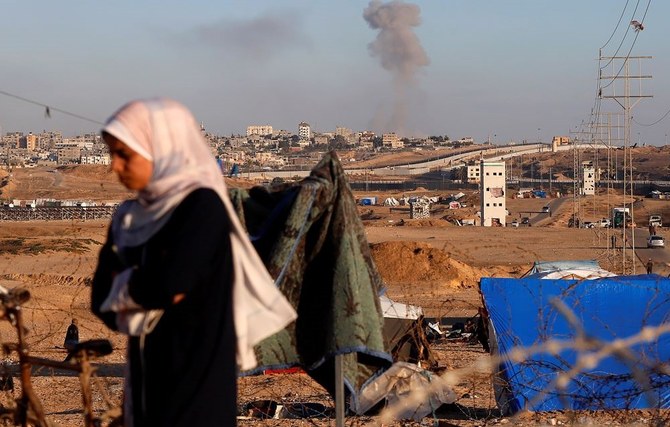
- President Abdel Fattah El-Sisi welcomes progress in recent talks
- Cairo warns Israel that attack on Rafah threatens over 1m in Gaza
CAIRO: Egypt’s President Abdel Fattah El-Sisi has welcomed Monday’s developments in peace talks about finalizing a truce in Israel’s war on Gaza.
El-Sisi said he was “closely following the positive developments pertinent to the ongoing negotiations to reach a comprehensive truce in the Gaza Strip.”
He called on all parties to exert more efforts to reach an agreement that will end the human tragedy of the Palestinian people and finalize the exchange of hostages and prisoners.
Hamas accepted an Egypt-Qatar mediated ceasefire proposal on Monday. The high-stakes diplomatic moves and military brinkmanship left a glimmer of hope alive — but only barely — for an accord that could bring at least a pause in the seven-month-old war that has devastated the Gaza Strip.
An armed conflict between Israel and Hamas-led Palestinian militant groups has been taking place chiefly in and around the Gaza Strip since Oct. 7. It began when Hamas launched a surprise attack on southern Israel from the Gaza Strip, killing around 1,200 people and taking 150 hostages.
Subsequent Israeli strikes against Gaza have driven around 80 percent of the territory’s population of 2.3 million from their homes and caused vast destruction to apartments, hospitals, mosques and schools across several cities.
The Palestinian death toll in Gaza has soared to more than 34,500 people, according to local health officials.
Meanwhile, Egypt’s Foreign Ministry said that it has warned of the dangers of a possible Israeli military operation in Gaza’s Rafah region, “since this escalatory act entails grave humanitarian dangers threatening more than 1 million Palestinians residing in this region.”
It called on Israel to exercise “utmost restraint, and refrain from further escalation at this extremely sensitive timing of ceasefire negotiations, spare the lives of Palestinian civilians who have been enduring an unprecedented humanitarian catastrophe since the outbreak of the war.”
It said that Egypt continues talking with all parties to prevent the situation from deteriorating.
Meanwhile Egypt’s Foreign Minister Sameh Shoukry discussed the Rafah situation with his UAE counterpart Sheikh Abdullah bin Zayed Al-Nahyan in a phone call.
They exchanged views regarding the possibility of Israeli forces carrying out a military operation in the besieged city.
Shoukry reiterated his warning of the dangers of an Israeli military escalation in Rafah, which is considered the last relatively safe area in the Gaza Strip and refuge for more than a million Palestinians.
The ministers stressed the urgency of reaching a truce agreement that allows for the swapping of hostages and detainees, and ensure a permanent ceasefire.
They agreed to continue talks with various parties to prevent the conflict from spreading to the region.
Hezbollah launches ‘explosive-laden drone’ attack on northern Israel
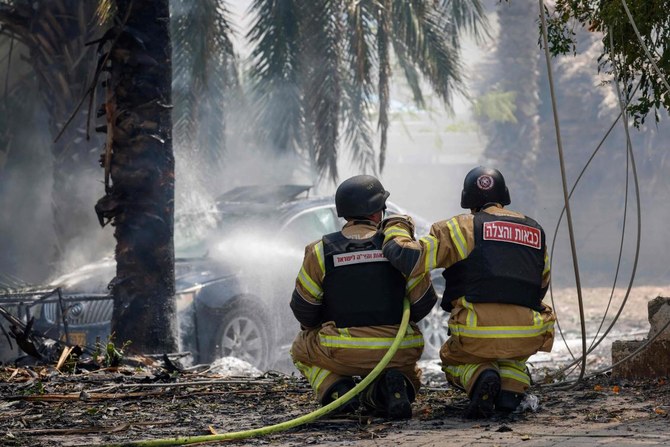
- Hezbollah fighters launched ‘explosive-laden drones targeting enemy soldiers and officers’
- At least 390 people have been killed, in Lebanon, in nearly seven months of cross-border violence
BEIRUT: Lebanon’s Hezbollah said it attacked northern Israel on Tuesday with “explosive-laden drones,” a day after an assault claimed by the Iran-backed movement killed two soldiers there.
Israel and Hezbollah have exchanged regular cross-border fire since Palestinian militant group Hamas’s unprecedented October 7 attack on southern Israel sparked war in the Gaza Strip.
In recent weeks Hezbollah has stepped up its attacks, which it says are in support of Gazans and its ally Hamas, and Israel’s military has struck deeper into Lebanese territory.
Hezbollah fighters on Tuesday launched “explosive-laden drones targeting enemy soldiers and officers,” the group said in a statement.
At the same time, other drones “targeted one of the Iron Dome (air defense system) platforms,” the militants said, adding in separate statements that they carried out other attacks on northern Israel, including with guided missiles.
Israel’s army said on Tuesday that two soldiers had been killed a day earlier in the north.
On Monday, Hezbollah claimed a drone attack on troops near northern Israel’s Metula, with the Israeli military saying “a UAV (drone) was identified crossing from Lebanon” into the area.
In Lebanon, at least 390 people have been killed in nearly seven months of cross-border violence, mostly militants but also more than 70 civilians, according to an AFP tally.
Israel says 13 soldiers and nine civilians have been killed on its side of the border.
Tens of thousands of people have been displaced on both sides.
UN says its access to Gaza’s Rafah crossing ‘denied’ by Israel
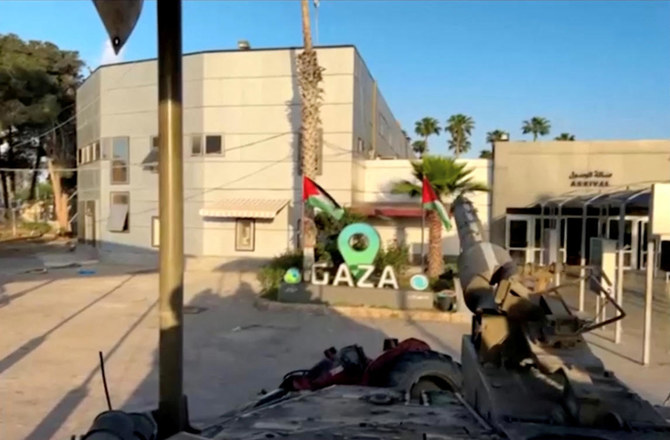
- UN says only has one day of fuel reserves in Gaza
GENEVA: Israeli authorities have denied the UN access to the closed Rafah crossing, the main entry point for humanitarian aid into the Gaza Strip, the United nations said Tuesday .
Jens Laerke, spokesman for the UN’s humanitarian agency OCHA, said there was only a one-day buffer of fuel to run humanitarian operations inside the besieged Palestinian territory.
“We currently do not have any physical presence at the Rafah crossing as our access... has been denied by COGAT,” he said, referring to the Israeli agency that oversees supplies into the Palestinian territories.
“We have been told there will be no crossings of personnel or goods in or out for the time being. That has a massive impact on how much stock do we have.
“There’s a very, very short buffer of one day of fuel available.
“As fuel only comes in through Rafah, the one day buffer is for the entire operation in Gaza.”
If no fuel comes in, “it would be a very effective way of putting the humanitarian operation in its grave,” said Laerke.
“Currently, the two main arteries for getting aid into Gaza are currently choked off,” he said, referring to the Rafah crossing from Egypt and the Kerem Shalom crossing from Israel.



